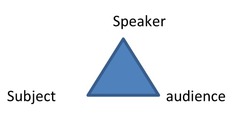AP Language and Composition: Tropes/Schemes, Classical Argument, Types of Essays
Unlock all answers in this set
Unlock answersquestion
Regionalism
answer
A blend of Realism and Romanticism, emphasizing locale (place) and the elements of local color-dress, customs, speech/language and etc.
question
Colloquialism
answer
An informal expression such as \"gonna\"
question
Vernacular
answer
Language of the common man; informal slang that each region uses
question
Rhetorical Question
answer
Figure of speech in the form of a question - \"With all the violence on TV today, is it any wonder kids bring guns to school?\"
question
Periodic Sentence
answer
Sentence whose main clause is withheld until the end - \"In spite of heavy snow and cold temperatures, the game continued.\"
question
Personification
answer
Attribution of a lifelike quality to an inanimate object or idea - \"Integrity thumbs its nose at pomposity.\"
question
Parallelism
answer
Similarity of structure in a pair of series of related words, phrases or clauses - \"She went diving, swimming, and snorkeling.\"
question
Oxymoron
answer
Paradoxical juxtaposition of words that seem to contradict one another - \"Bill is a cheerful pessimist.\"
question
Metonymy
answer
Using a single feature to represent the whole - \"Lend me your ears\"
question
Metaphor
answer
Figure of speech that says one thing in order to explain by comparison - \"Debt is a bottomless sea.\"
question
Juxtaposition
answer
Placement of two things closely together to emphasize comparisons or contrasts
question
Inversion
answer
Inverted order of words in a sentence (variation of the subject-verb-object order) - \"What a beautiful picture it is.\"
question
Imperative Sentence
answer
Sentence used to command, enjoin, implore, or entrent - \"Clear this desk by tomorrow!\"
question
Horative Sentence
answer
Sentence that exhorts, advises, calls to action - \"All of your training and hard work will pay off; you will be great.\"
question
Cumulative Sentence
answer
Sentence that completes the main idea at the beginning of the sentence, and then builds and adds on - \"A breeze blew through the room, blew curtains in at one end and out the other like pale flags, twisting them up toward the frosted wedding cake of the ceiling\"
question
Asyndeton
answer
Omission of conjunctions between coordinate phrases, clauses, or words - \"It was happy, sad, angry, disgusted.\"
question
Archaic Diction
answer
Old-fashioned or outdated choice of words
question
Antithesis
answer
Opposition or contrast of ideas is expressed by parallel construction contrasted with each other - \"Americans in need are not strangers, they are citizens, not problems, but priorities.\"
question
Antimetabole
answer
Repetition of words in an inverted order to sharpen a contrast - \"You can take the gorilla out of the jungle, but you can't take the jungle out of the gorilla.\"
question
Anaphora
answer
Repetition of words at the beginning of successive clauses - \"I will fight for you. I will fight to save Social Security. I will fight to raise the minimum wage.\"
question
Allusion
answer
An indirect reference, often to another text or a historic event
question
Alliteration
answer
Repetition of the same sound or letter at the beginning of consecutive words - \"Little lever\"
question
Rhetoric
answer
The study of effective, persuasive language use; according to Aristotle, use of the \"available means of persuasion\"
question
Audience
answer
One's listener or readership; those to whom a speech or piece of writing is addressed
question
Context
answer
Words, events or circumstances that help determine meaning
question
Purpose
answer
One's intention or objective in a speech or piece of writing
question
Thesis
answer
The central idea in a work to which all parts of the work refer
question
Claim
answer
An assertion, usually supported by evidence
question
Assertion
answer
An emphatic statement; declaration. An assertion supported by evidence becomes an argument
question
Subject
answer
In rhetoric, the topic addressed in a piece of writing
question
Speaker
answer
A term used for the author, speaker, or the person whose perspective (real or imagined) is being advanced in a speech or piece of writing
question
Rhetorical/Aristotelian Triangle

answer
a diagram that represents a rhetorical situation as the relationship among the speaker, the subject, and the audience
question
Persona
answer
The speaker, voice, or character assumed by the author of a piece of writing
question
Ethos
answer
A greek term referring to the character of a person; one of Aristotle's three rhetorical appeals
question
Logos
answer
A greek term that means \"word\"; an appeal to logic; one of Aristotle's three rhetorical appeals
question
Pathos
answer
A greek term that refers to suffering but has come to be associated with broader appeals to emotion; one of Aristotle's three rhetorical appeals
question
Tone
answer
The speaker's attitude toward the subject or audience
question
Assumption
answer
A belief or statement taken for granted without proof
question
Counterargument
answer
A challenge to a position; an opposing argument
question
Concede
answer
A reluctant acknowledgement or yielding
question
Refute
answer
To discredit an argument, particularly a counterargument
question
Connotation
answer
That which is implied by a word, as opposed to the world's literal meaning
question
Propagandistic
answer
A negative term for writing designed to sway opinion rather than present information
question
Polemical
answer
An argument against an idea, usually regarding philosophy, politics or religion
question
Satiric
answer
An ironic, sarcastic, or witty compoisition that claims to argue for something, but actually argues against it
question
Arrangement
answer
Organization of a piece; another element for rhetoric
question
Induction
answer
Reasoning from specific to general
question
Exordium
answer
The introduction-introduces the reader to the subject under discussion (in an essay)
question
Narratio
answer
Narration provides factual information and background material on the subject at hand; established why the subject is a problem that needs addressing (in an essay)
question
Confirmatio
answer
Usually the major part of the text, containing the most specific and concrete detail in the text (in an essay)
question
Refutatio
answer
Addresses the counterargument, and is a bridge between the writer's proof and conclusion
question
Peroration
answer
Brings the essay to a satisfying close
question
Narration
answer
Refers to telling a story or recounting a series of events, based on personal experience or on knowledge gained form reading or observation
question
Description
answer
Emphasizes the senses by painting a picture of how something looks, sounds, smells, tastes, or feels. Often used to establish a mood or atmosphere
question
Process Analysis
answer
Explains how something works, how to do something, or how something was done
question
Exemplification
answer
Provides, facts, specific cases, or instances and turns a general idea into a concrete one
question
Comparison and contrast
answer
Juxtaposing two things to highlight their similarities and differences
question
Classification and Division
answer
Sort material or ideas into major categories
question
Definition
answer
Defining a term to debate, or clarify terms
question
Cause and Effect
answer
Used in arguments where analyzing the causes that lead to a certain effect or, conversely is a powerful foundation
question
Zeugma
answer
One verb governs several words, or clauses, each in a different sense - \"He stiffened his drink and his spine.\"



